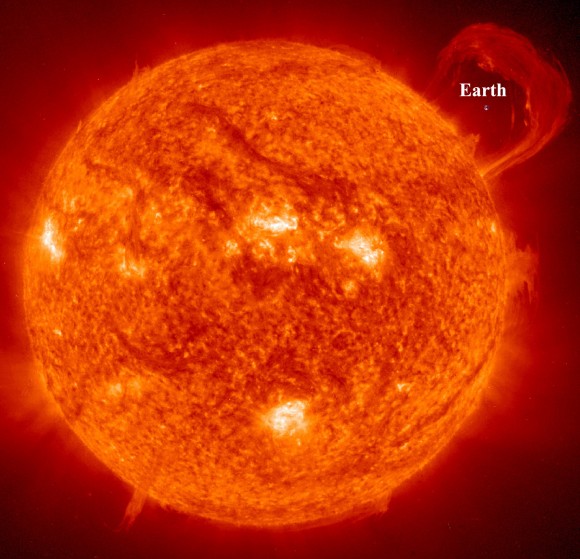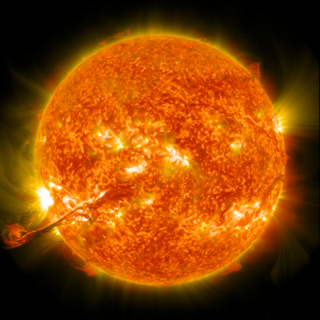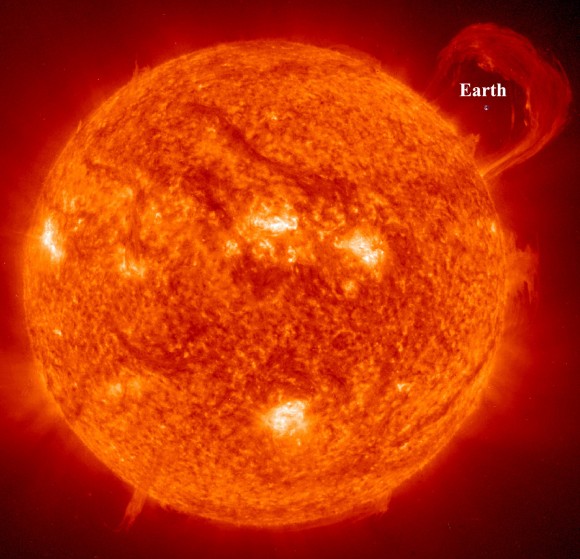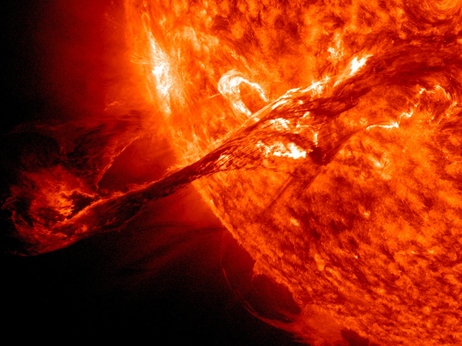It looks like you're using an Ad Blocker.
Please white-list or disable AboveTopSecret.com in your ad-blocking tool.
Thank you.
Some features of ATS will be disabled while you continue to use an ad-blocker.
10
share:
New video from NASA's Solar Dynamics Observatory shows a solar eruption that apparently reached a half million miles out into space. That's insane.
Wow! NASA Video Shows 'Mind-Bogglingly Gorgeous' Solar Eruption
Not trying to get off-topic, but when I saw this video I couldn't help but think how little people discuss the sun's activity and likely role when addressing unusual weather on Earth.
Wow! NASA Video Shows 'Mind-Bogglingly Gorgeous' Solar Eruption
And, says NASA, the eruption "did not travel directly toward Earth," though it did give a "glancing blow" to the planet's "magnetic environment" on Monday.
Not trying to get off-topic, but when I saw this video I couldn't help but think how little people discuss the sun's activity and likely role when addressing unusual weather on Earth.
edit on 6-9-2012 by bacci0909 because: (no reason given)
Holy crap! it looked like half the sun blew out when they did the far away shot of the eruption. Thats the biggest solar flare I've ever seen.
Very impressive. The size of it is just unreal.
reply to post by tvtexan
Thank you for embedding the photo. I was scrambling to and gave up. Star for you, considerate sir
Thank you for embedding the photo. I was scrambling to and gave up. Star for you, considerate sir
Originally posted by BASSPLYR
Holy crap! it looked like half the sun blew out when they did the far away shot of the eruption. Thats the biggest solar flare I've ever seen. Very impressive. The size of it is just unreal.
I know.. that shot really puts into perspective the amount of energy we're talking when these things go off. Completely unfathomable to my tiny brain
And this is not the biggest of the stars in the galaxy Truely mind boggling. S&F for the post.
Originally posted by bacci0909
Originally posted by BASSPLYR
Holy crap! it looked like half the sun blew out when they did the far away shot of the eruption. Thats the biggest solar flare I've ever seen. Very impressive. The size of it is just unreal.
I know.. that shot really puts into perspective the amount of energy we're talking when these things go off. Completely unfathomable to my tiny brain
edit on 6-9-2012 by hp1229 because:
(no reason given)
Just to put things in perspective here is a picture of the sun compared to earth

and here is the size of the eruption compared to the sun, if earth was anywhere near the sun this would turn it into dust


and here is the size of the eruption compared to the sun, if earth was anywhere near the sun this would turn it into dust

edit on 9/6/2012 by taws6 because: (no reason given)
It is a great picture!
stereo.gsfc.nasa.gov...
Note there can be significant effects from space weather, but Earth weather isn't listed among them, if that's what you were trying to suggest, in which case I would have no idea why you would suggest that. Even in the solar storm of 1859 I don't think Earth weather was affected, though the northern lights appeared much further south than normal, which is interesting, but I'm not sure that's weather.
The sun's activity affects space weather and there are people who monitor that:
Originally posted by bacci0909
Not trying to get off-topic, but when I saw this video I couldn't help but think how little people discuss the sun's activity and likely role when addressing unusual weather on Earth.
stereo.gsfc.nasa.gov...
Space weather happens when a solar storm from the Sun travels through space and impacts the Earth’s magnetosphere. Studying space weather is important to our national economy because solar storms can affect the advanced technology we have become so dependent upon in our everyday lives. Energy and radiation from solar flares and coronal mass ejections can:
Harm astronauts in space
Damage sensitive electronics on orbiting spacecraft…
Cause colorful auroras, often seen in the higher latitudes…
Create blackouts on Earth when they cause surges in power grids.
Note there can be significant effects from space weather, but Earth weather isn't listed among them, if that's what you were trying to suggest, in which case I would have no idea why you would suggest that. Even in the solar storm of 1859 I don't think Earth weather was affected, though the northern lights appeared much further south than normal, which is interesting, but I'm not sure that's weather.
reply to post by Arbitrageur
It does affect Earth's weather. Even the NOAA concludes this. They list solar activity as one of four factors that determine our climate.
From a common-sense standpoint, in my opinion it would be silly to think that an enormous thrust of protons and other such energy couldn't affect us here on this delicate little planet. It could destroy is if it 'wanted to'.

Note there can be significant effects from space weather, but Earth weather isn't listed among them
It does affect Earth's weather. Even the NOAA concludes this. They list solar activity as one of four factors that determine our climate.
From a common-sense standpoint, in my opinion it would be silly to think that an enormous thrust of protons and other such energy couldn't affect us here on this delicate little planet. It could destroy is if it 'wanted to'.

edit on 6-9-2012 by bacci0909 because: (no reason given)
You realize of course that climate and weather are two different terms? Yes there is a relationship but they mean different things.
Originally posted by bacci0909
It does affect Earth's weather. Even the NOAA concludes this. They list solar activity as one of four factors that determine our climate.
The NOAA is talking about the total energy output of the sun as a variable that affects our climate. And eventually changes in climate can affect weather.
A solar flare is a temporary disturbance. Are you saying the NOAA says a solar flare affects Earth weather? If so, I'd love to see that link.
Originally posted by Arbitrageur
You realize of course that climate and weather are two different terms? Yes there is a relationship but they mean different things.
Originally posted by bacci0909
It does affect Earth's weather. Even the NOAA concludes this. They list solar activity as one of four factors that determine our climate.
The NOAA is talking about the total energy output of the sun as a variable that affects our climate. And eventually changes in climate can affect weather.
A solar flare is a temporary disturbance. Are you saying the NOAA says a solar flare affects Earth weather? If so, I'd love to see that link.
First off, yes I do understand that climate and weather are two different things.
Second, here's the link:
How Do Human Activities Contribute To Climate Change And How Do They Compare With Natural Influences?
Natural forcings arise due to solar changes and explosive volcanic eruptions. Solar output has increased gradually in the industrial era, causing a small positive radiative forcing (see Figure 2). This is an addition to the cyclic changes in solar radiation that follow an 11-year cycle. Solar energy directly heats the climate system and can also affect the atmospheric abundance of some greenhouse gases, such as stratospheric ozone.
Now.. with that said, I'd like to withdrawal my matter-of-fact tone. I concede that essentially, you are correct, though it seems to be a complex and somewhat debatable matter.
It's hard for me to imagine that the sun has little to do with our weather.. but deny ignorance I shall try.
In my mind the sun affects anything or anyone that is close enough to feel it and see it.
But then again I am not constrained by theories that one day may be considered obsolete
Nice pictures.
But then again I am not constrained by theories that one day may be considered obsolete
Nice pictures.
238,857 is the average distance in miles to the moon. 477,714 miles being the distance, on average, one would travel during the round trip, which
means that this massive solar flare while impressive, covered just over the distance from here to the moon and back.Assuming the half a million miles
statement was accurate. Hell, mankind traveled that far once.
new topics
-
Comparing the theology of Paul and Hebrews
Religion, Faith, And Theology: 22 minutes ago -
Pentagon acknowledges secret UFO project, the Kona Blue program | Vargas Reports
Aliens and UFOs: 1 hours ago -
Boston Dynamics say Farewell to Atlas
Science & Technology: 1 hours ago -
I hate dreaming
Rant: 2 hours ago -
Man sets himself on fire outside Donald Trump trial
Mainstream News: 4 hours ago -
Biden says little kids flip him the bird all the time.
2024 Elections: 4 hours ago -
The Democrats Take Control the House - Look what happened while you were sleeping
US Political Madness: 4 hours ago -
Sheetz facing racial discrimination lawsuit for considering criminal history in hiring
Social Issues and Civil Unrest: 4 hours ago -
In an Historic First, In N Out Burger Permanently Closes a Location
Mainstream News: 6 hours ago -
MH370 Again....
Disaster Conspiracies: 7 hours ago
top topics
-
In an Historic First, In N Out Burger Permanently Closes a Location
Mainstream News: 6 hours ago, 14 flags -
The Democrats Take Control the House - Look what happened while you were sleeping
US Political Madness: 4 hours ago, 11 flags -
Thousands Of Young Ukrainian Men Trying To Flee The Country To Avoid Conscription And The War
Other Current Events: 17 hours ago, 8 flags -
A man of the people
Medical Issues & Conspiracies: 12 hours ago, 8 flags -
Man sets himself on fire outside Donald Trump trial
Mainstream News: 4 hours ago, 7 flags -
Biden says little kids flip him the bird all the time.
2024 Elections: 4 hours ago, 6 flags -
4 plans of US elites to defeat Russia
New World Order: 13 hours ago, 4 flags -
Pentagon acknowledges secret UFO project, the Kona Blue program | Vargas Reports
Aliens and UFOs: 1 hours ago, 4 flags -
Sheetz facing racial discrimination lawsuit for considering criminal history in hiring
Social Issues and Civil Unrest: 4 hours ago, 3 flags -
Are you ready for the return of Jesus Christ? Have you been cleansed by His blood?
Religion, Faith, And Theology: 9 hours ago, 3 flags
active topics
-
12 jurors selected in Trump criminal trial
US Political Madness • 108 • : ImagoDei -
The Democrats Take Control the House - Look what happened while you were sleeping
US Political Madness • 37 • : Mahogani -
The defamation of Mary Magdalene
Religion, Faith, And Theology • 15 • : Solvedit -
A man of the people
Medical Issues & Conspiracies • 9 • : tarantulabite1 -
Silent Moments --In Memory of Beloved Member TDDA
Short Stories • 47 • : Naftalin -
Thousands Of Young Ukrainian Men Trying To Flee The Country To Avoid Conscription And The War
Other Current Events • 38 • : DBCowboy -
George Knapp AMA on DI
Area 51 and other Facilities • 28 • : theshadowknows -
Pentagon acknowledges secret UFO project, the Kona Blue program | Vargas Reports
Aliens and UFOs • 4 • : Ophiuchus1 -
Comparing the theology of Paul and Hebrews
Religion, Faith, And Theology • 0 • : DISRAELI2 -
Man sets himself on fire outside Donald Trump trial
Mainstream News • 30 • : HatesFreshAir
10

